When it comes to securing your interests, having legal representation is paramount. Acknowledging the need for an attorney not only shows your commitment to navigating the complexities of the legal system, but it also ensures that your rights and benefits are well protected. It's essential to recognize the role your legal representative plays in advocating for you, particularly as a beneficiary. Ready to learn how to formally acknowledge this vital partnership? Read on for a comprehensive letter template!

Client and Attorney Information
In legal proceedings, clear acknowledgment of representation is crucial for establishing the relationship between a client and their attorney. The client's information, including their name, address, and contact details, should be prominently displayed to ensure accurate identification. Similarly, the attorney's information, including their law firm, credentials, and state bar number, provides legitimacy and accountability. This acknowledgment serves not only as a formal declaration of the attorney's role in representing the client's interests but also confirms that the client understands their rights and obligations. Documentation should ideally be signed by both parties, reinforcing the agreement and ensuring transparency throughout the legal process.
Legal Representation Scope and Purpose
The legal representation for beneficiaries, specifically in estate planning and probate cases, encompasses a range of services aimed at safeguarding the interests of individuals who inherit assets. This representation includes tasks such as reviewing legal documents like wills and trusts, ensuring compliance with state laws in jurisdictions like California or New York, addressing disputes among beneficiaries, and facilitating the transfer of assets. Moreover, attorneys may provide advice regarding tax implications associated with inheritances, including estate taxes that can reach up to 40% in the United States, and guide beneficiaries through the probate process, which can last from several months to years depending on the complexity of the estate. The ultimate aim of this legal support is to ensure that beneficiaries rightly receive their entitlements while mitigating potential conflicts or legal issues that may arise throughout the process.
Terms and Conditions Outlining the Agreement
Beneficiary legal representation acknowledgment entails a clear understanding between the represented party and the legal representative firm. Terms and Conditions, such as service scope, confidentiality obligations, and fee structures, are crucial elements of this agreement. The representation typically covers specific legal matters, like estate claims or contract disputes, ensuring proper advocacy. It is important to outline the responsibilities of both the beneficiary and the attorney, including timelines for communication and documentation. Acknowledgment of potential conflicts of interest or limitations on representation should also be addressed, safeguarding the interests of all parties involved. Lastly, the agreement should indicate how disputes will be resolved, whether through mediation, arbitration, or litigation in relevant jurisdictions.
Contact Information for Communication
Beneficiaries seeking legal representation should provide comprehensive contact information to ensure efficient communication. Essential details include full name for accurate identification, mailing address consisting of street number, city, state, and ZIP code to facilitate correspondence, and valid phone numbers, such as mobile or home numbers for direct communication. An email address serves as an alternative method, allowing for prompt updates and document exchanges. Additionally, noting preferred times for contact may enhance communication effectiveness, ensuring that beneficiaries remain informed about their legal matters and any associated developments. Providing this detailed contact information helps legal representatives maintain clarity and accessibility throughout the representation process.
Acknowledgment and Confirmation of Representation
An acknowledgment and confirmation of representation serves as a formal notification regarding legal representation in significant cases involving beneficiaries. This document typically outlines the scope of the legal services provided by the attorney or law firm, including any specific actions taken to safeguard the interests of the beneficiary, such as estate administration, trust management, or litigation related to inheritance disputes. Essential details include the names of all parties involved, the case reference number for accurate tracking, and any relevant deadlines or court dates. Additionally, the acknowledgment may reference pertinent laws, such as the Uniform Probate Code, which governs the resolution of disputes over wills or estate assets. Overall, this representation confirmation ensures all beneficiaries are informed of their legal standing and the strategies employed to protect their rights following an event like death or incapacitation of an estate owner.
Letter Template For Beneficiary Legal Representation Acknowledgment Samples
Letter template of Acknowledgment of Legal Representation for Beneficiary
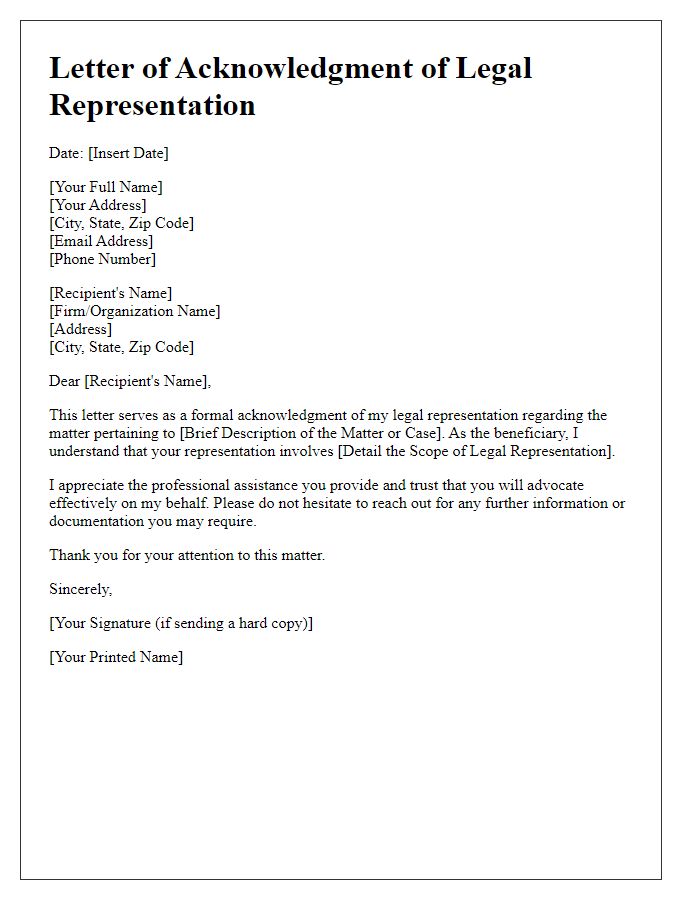
Letter template of Legal Counsel Representation for Beneficiary Acknowledgment

Letter template of Acknowledgment of Representation on Behalf of Beneficiary
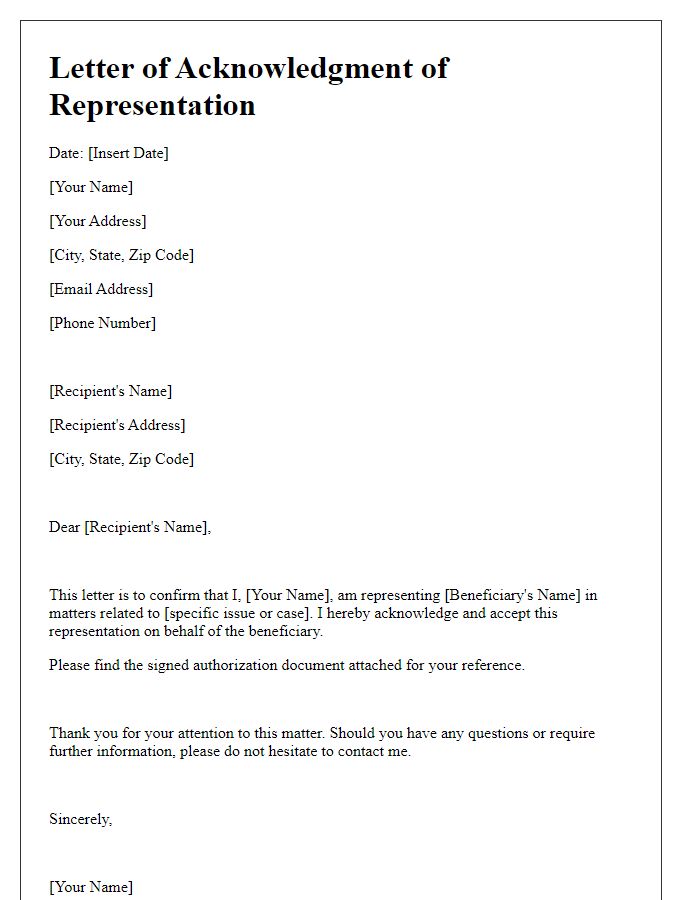

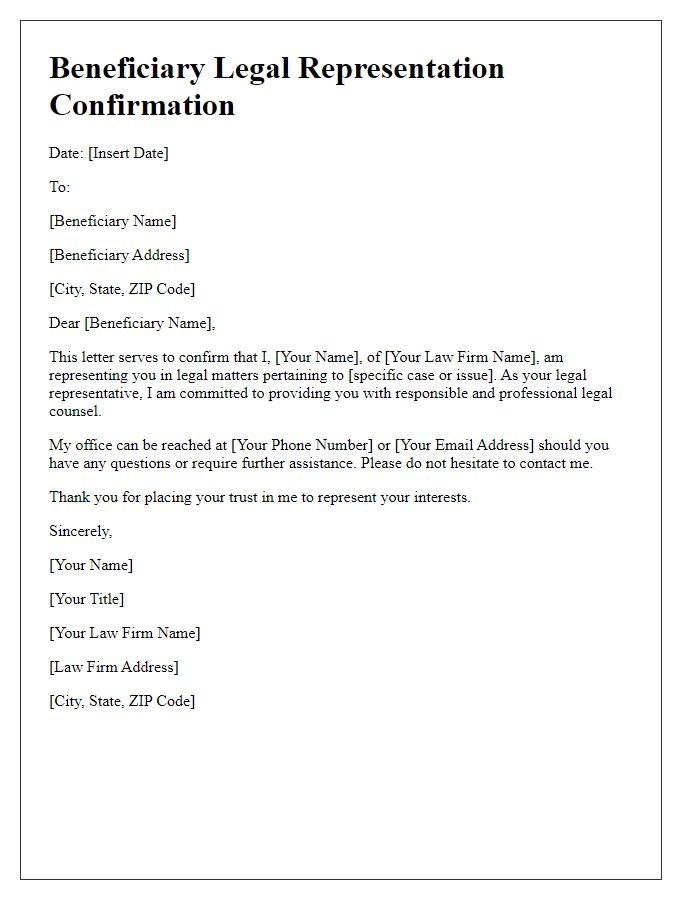
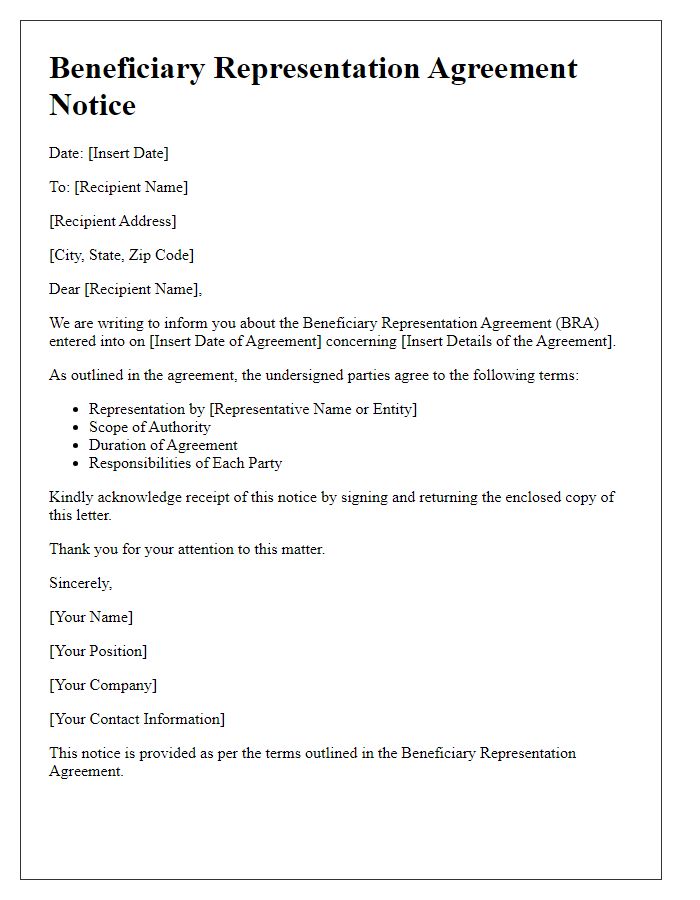
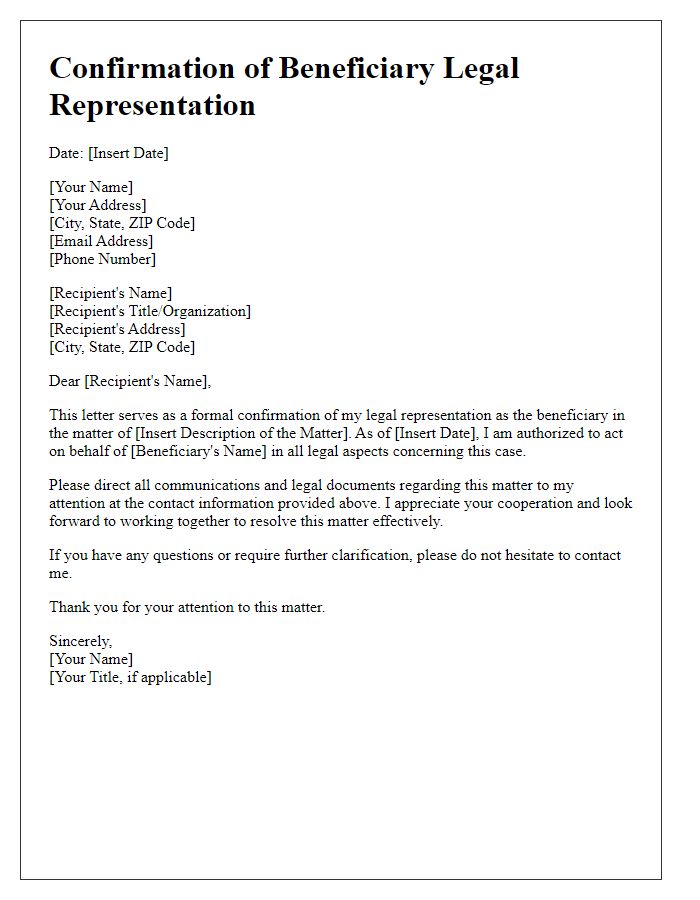
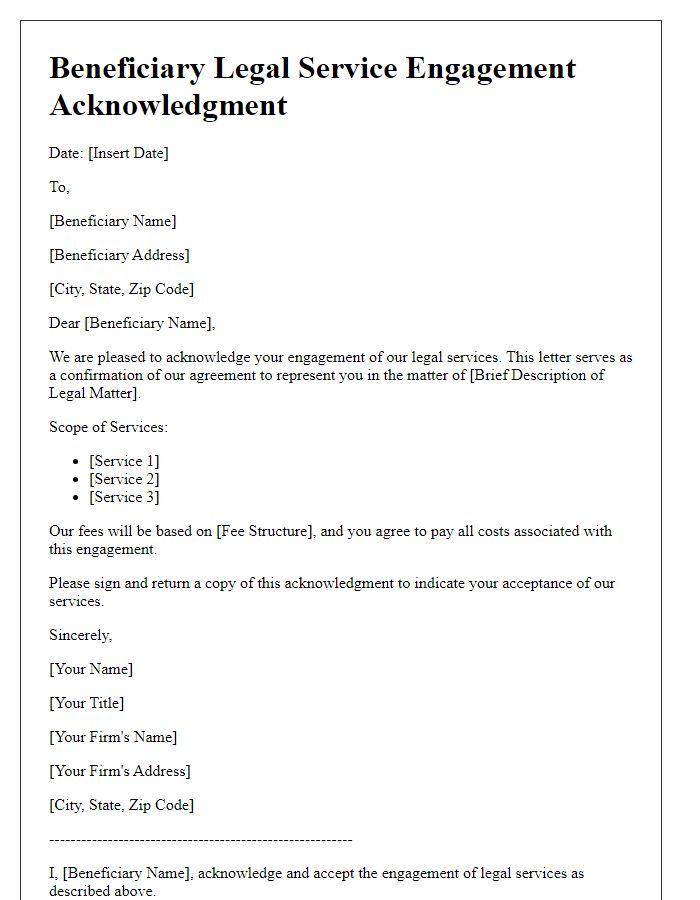
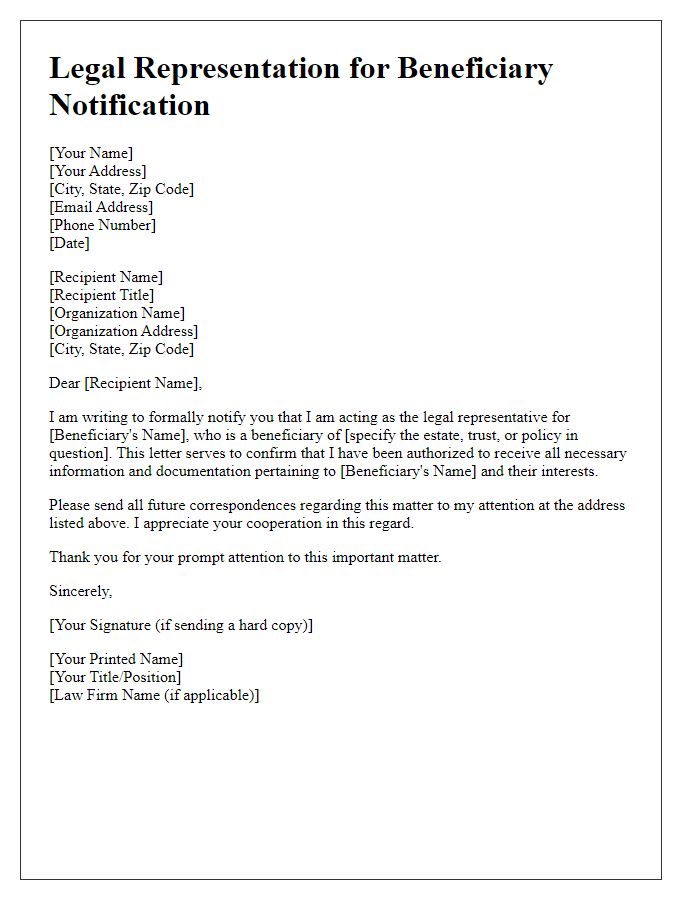
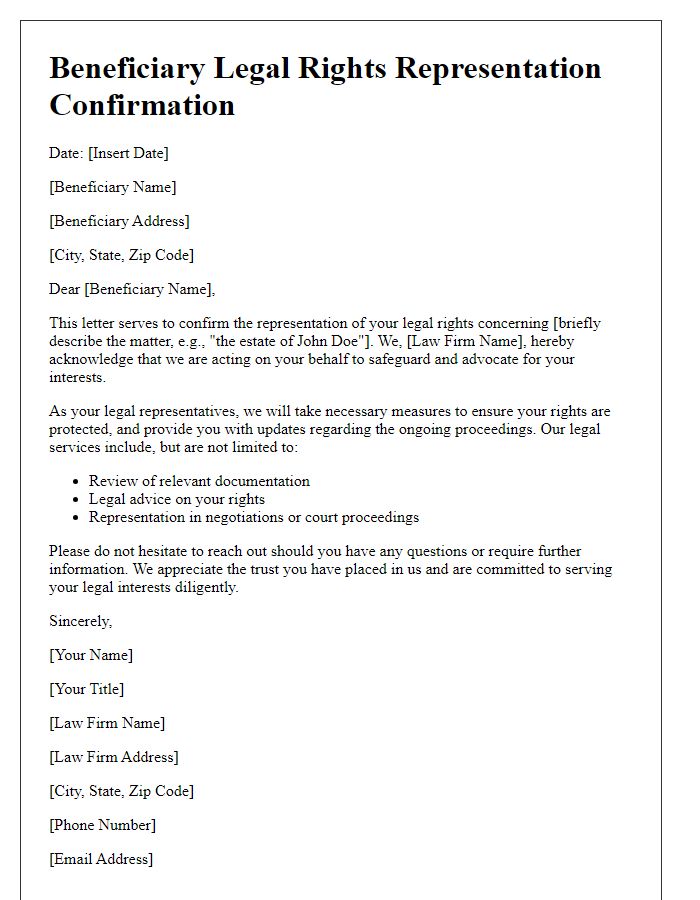
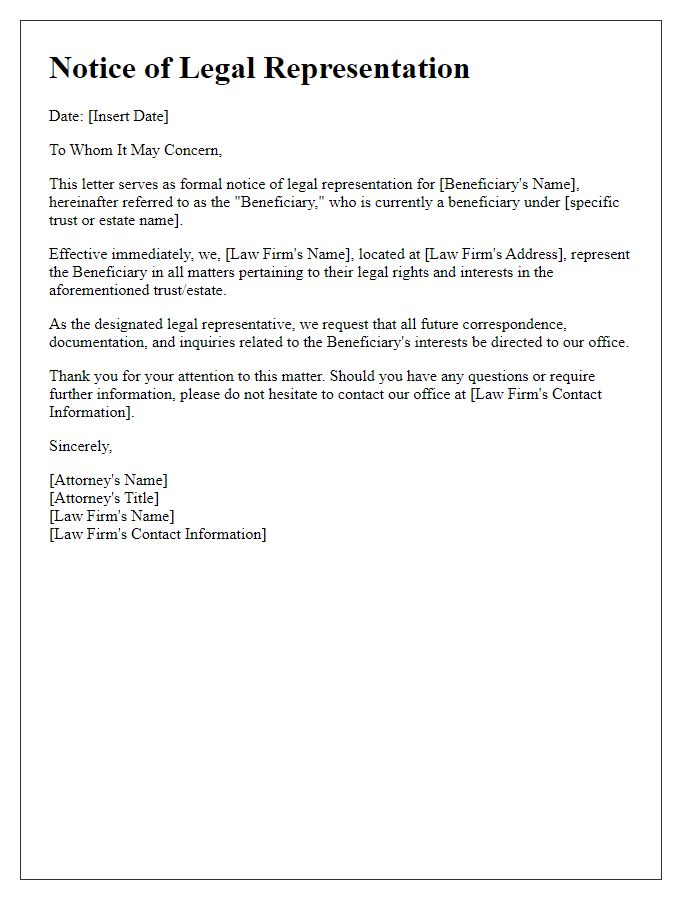


Comments